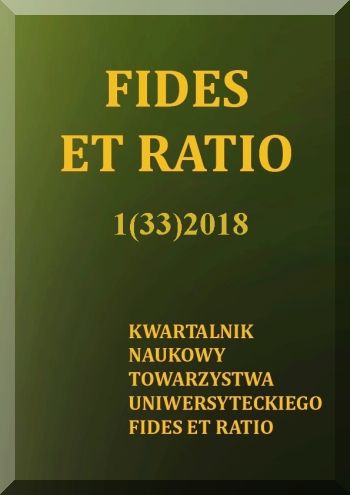Abstract
Marriage is a unique relationship. It is the basis of family life. This bond determines the quality of life of the whole community that they constitute. Spouses are responsible for each other and for children they bring into the world. The marital bond is unique, special, very close and intimate. From now on, two separate people become one. By connecting with each other, spouses form a special community of people who become responsible for each other. One spouse influences the other. The basis of this community is the relationship of love. This love is not monotonous, but it is subject to constant development. Spouses should grow in love all the time and continue to deepen it in changing life circumstances. The main problem of this article is the answer to the question: what should the division of responsibilities in a partner marriage look like? The first section of the article consists of theoretical considerations on marriage, changes in the marriage model over the years, and partner marriage. The second section was the juxtaposition of the results of certain research on the division of responsibilities in the family. Those findings were compared with surveys conducted by the Public Opinion Research Center in Poland. In the final section, some general conclusions concerning these issues were presented.
References
Braun-Gałkowska M., (1997), Psychologia domowa, Olsztyn: Warmińskie Wydawnictwo Diecezjalne.
Braun-Gałkowska M., (2008), Psychologia domowa, Lublin: Wydawnictwo KUL.
Centrum Badania Opinii Społecznej (2013), Komunikat badań o roli kobiet w rodzinie BS/30/2013, Warszawa.
Czekajewska J., (2014), Przemiany życia rodzinnego. Studium etyczne, Toruń: Wydawnictwo.
Izdebska J., (2015), Dziecko – dzieciństwo – rodzina – wychowanie rodzinne. Kategorie pedagogiki rodziny w perspektywie personalistycznej, Białystok: Wydawnictwo NWSP.
Jeziorański M., (2012), Osobowy i wspólnotowy wymiar rozwoju małżonków w nauczaniu Jana Pawła II. W: M. Jeziorański, D. Opozda, A. Rynio (red.), Rodzina przestrzenią rozwoju osoby. Perspektywa pedagogiczna, Lublin: Towarzystwo Naukowe KUL.
Kwak A., (2014), Refleksje nad współczesną rodziną – kontrowersje, pytania, wartości. W: A. Jabłoński, M. Szyszka, D. Gizicka (red.), Współczesna rodzina polska. Przemiany, zagrożenia i wyzwania, Lublin: Wydawnictwo KUL.
Liberska H., Matuszewska M., (2001), Wybrane psychologiczno-społeczne mechanizmy funkcjonowania małżeństwa. W: H. Liberska, M. Matuszewska (red.), Małżeństwo: męskość, kobiecość, miłość, konflikt, Poznań: Wydawnictwo Fundacji Humaniora.
Ostrouch-Kamińska J., (2011), Rodzina partnerska jako relacja współzależnych podmiotów. Studium socjo-pedagogiczne narracji rodziców przeciążonych rolami, Kraków: Wydawnictwo Impuls.
Partner, W: Słownik języka polskiego (2007), Warszawa: Wydawnictwo Naukowe PWN, 2007.
Partnerstwo u młodzieży i dorosłych. W: Nowy słownik pedagogiczny (1998), W. Okoń (red.), Warszawa: Wydawnictwo Żak.
Schmidt F., (2015), Para, mieszkanie małżeństwo. Dynamika związków intymnych na tle przemian historycznych i współczesnych dyskusji o procesach indywidualizacji, Warszawa-Toruń, Wydawnictwo Naukowe UMK.
Tyszka Z., (2003), Rodzina we współczesnym świecie, Poznań: Wydawnictwo Naukowe UAM.
Zajączkowski P., (2014), Postawy wobec prokreacji a więź małżeńska. Studium empiryczne z Duszpasterstwa Rodzin na podstawie badań małżonków w parafii Braci Mniejszych Kapucynów w Lublinie, Biała Podlaska: Wydawnictwo PSW JPII.
